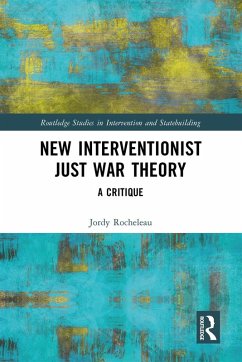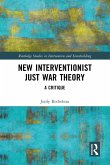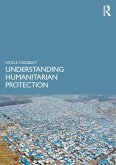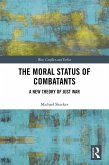44,95 €
44,95 €
inkl. MwSt.
Sofort per Download lieferbar

22 °P sammeln
44,95 €
Als Download kaufen

44,95 €
inkl. MwSt.
Sofort per Download lieferbar

22 °P sammeln
Jetzt verschenken
Alle Infos zum eBook verschenken
44,95 €
inkl. MwSt.
Sofort per Download lieferbar
Alle Infos zum eBook verschenken

22 °P sammeln
- Format: ePub
- Merkliste
- Auf die Merkliste
- Bewerten Bewerten
- Teilen
- Produkt teilen
- Produkterinnerung
- Produkterinnerung

Bitte loggen Sie sich zunächst in Ihr Kundenkonto ein oder registrieren Sie sich bei
bücher.de, um das eBook-Abo tolino select nutzen zu können.
Hier können Sie sich einloggen
Hier können Sie sich einloggen
Sie sind bereits eingeloggt. Klicken Sie auf 2. tolino select Abo, um fortzufahren.

Bitte loggen Sie sich zunächst in Ihr Kundenkonto ein oder registrieren Sie sich bei bücher.de, um das eBook-Abo tolino select nutzen zu können.
This book offers a systematic critique of recent interventionist just war theories, which have made the recourse to force easier to justify.
- Geräte: eReader
- mit Kopierschutz
- eBook Hilfe
Andere Kunden interessierten sich auch für
![New Interventionist Just War Theory (eBook, PDF) New Interventionist Just War Theory (eBook, PDF)]() Jordy RocheleauNew Interventionist Just War Theory (eBook, PDF)44,95 €
Jordy RocheleauNew Interventionist Just War Theory (eBook, PDF)44,95 €![Just War Thinkers (eBook, ePUB) Just War Thinkers (eBook, ePUB)]() Just War Thinkers (eBook, ePUB)40,95 €
Just War Thinkers (eBook, ePUB)40,95 €![Just War Thinkers Revisited (eBook, ePUB) Just War Thinkers Revisited (eBook, ePUB)]() Just War Thinkers Revisited (eBook, ePUB)39,95 €
Just War Thinkers Revisited (eBook, ePUB)39,95 €![Understanding Humanitarian Protection (eBook, ePUB) Understanding Humanitarian Protection (eBook, ePUB)]() Noele CrossleyUnderstanding Humanitarian Protection (eBook, ePUB)37,95 €
Noele CrossleyUnderstanding Humanitarian Protection (eBook, ePUB)37,95 €![Contesting Torture (eBook, ePUB) Contesting Torture (eBook, ePUB)]() Contesting Torture (eBook, ePUB)42,95 €
Contesting Torture (eBook, ePUB)42,95 €![Law, Ethics and Emerging Military Technologies (eBook, ePUB) Law, Ethics and Emerging Military Technologies (eBook, ePUB)]() George LucasLaw, Ethics and Emerging Military Technologies (eBook, ePUB)37,95 €
George LucasLaw, Ethics and Emerging Military Technologies (eBook, ePUB)37,95 €![The Moral Status of Combatants (eBook, ePUB) The Moral Status of Combatants (eBook, ePUB)]() Michael SkerkerThe Moral Status of Combatants (eBook, ePUB)44,95 €
Michael SkerkerThe Moral Status of Combatants (eBook, ePUB)44,95 €-
-
-
This book offers a systematic critique of recent interventionist just war theories, which have made the recourse to force easier to justify.
Dieser Download kann aus rechtlichen Gründen nur mit Rechnungsadresse in A, B, BG, CY, CZ, D, DK, EW, E, FIN, F, GR, HR, H, IRL, I, LT, L, LR, M, NL, PL, P, R, S, SLO, SK ausgeliefert werden.
Produktdetails
- Produktdetails
- Verlag: Taylor & Francis eBooks
- Seitenzahl: 254
- Erscheinungstermin: 22. November 2021
- Englisch
- ISBN-13: 9781000482751
- Artikelnr.: 62782566
- Verlag: Taylor & Francis eBooks
- Seitenzahl: 254
- Erscheinungstermin: 22. November 2021
- Englisch
- ISBN-13: 9781000482751
- Artikelnr.: 62782566
- Herstellerkennzeichnung Die Herstellerinformationen sind derzeit nicht verfügbar.
Jordy Rocheleau is Professor of Philosophy at Austin Peay State University, USA. He is co-author of Rights and Wrongs in the College Classroom (2007).
Introduction Part I: Ethical constraints on recourse to war: jus ad bellum
vs realism and neo-traditionalism 1. Just war theory and the ethical
restraint of war 2. Presumptions, principles, and prerogatives in war:
against hawkish neo-traditionalism 3. Why punishment is not a just cause
for war Part II: Defense of a just cause threshold 4. Against the new
cosmopolitan interventionism: why human rights protection is not sufficient
cause for war 5. What is it good for? Consequences and the limits of war 6.
Why two wrongs cannot make a right use of force: A critique of compound
just causes Part III: Just war procedures and application 7. Jus ad
(continuandum) bellum: reevaluating the justice of interventions over time
8. The nature and necessity of legitimate authorization 9. Conclusion:
applying non-interventionist jus ad bellum
vs realism and neo-traditionalism 1. Just war theory and the ethical
restraint of war 2. Presumptions, principles, and prerogatives in war:
against hawkish neo-traditionalism 3. Why punishment is not a just cause
for war Part II: Defense of a just cause threshold 4. Against the new
cosmopolitan interventionism: why human rights protection is not sufficient
cause for war 5. What is it good for? Consequences and the limits of war 6.
Why two wrongs cannot make a right use of force: A critique of compound
just causes Part III: Just war procedures and application 7. Jus ad
(continuandum) bellum: reevaluating the justice of interventions over time
8. The nature and necessity of legitimate authorization 9. Conclusion:
applying non-interventionist jus ad bellum
Introduction Part I: Ethical constraints on recourse to war: jus ad bellum vs realism and neo-traditionalism 1. Just war theory and the ethical restraint of war 2. Presumptions, principles, and prerogatives in war: against hawkish neo-traditionalism 3. Why punishment is not a just cause for war Part II: Defense of a just cause threshold 4. Against the new cosmopolitan interventionism: why human rights protection is not sufficient cause for war 5. What is it good for? Consequences and the limits of war 6. Why two wrongs cannot make a right use of force: A critique of compound just causes Part III: Just war procedures and application 7. Jus ad (continuandum) bellum: reevaluating the justice of interventions over time 8. The nature and necessity of legitimate authorization 9. Conclusion: applying non-interventionist jus ad bellum
Introduction Part I: Ethical constraints on recourse to war: jus ad bellum
vs realism and neo-traditionalism 1. Just war theory and the ethical
restraint of war 2. Presumptions, principles, and prerogatives in war:
against hawkish neo-traditionalism 3. Why punishment is not a just cause
for war Part II: Defense of a just cause threshold 4. Against the new
cosmopolitan interventionism: why human rights protection is not sufficient
cause for war 5. What is it good for? Consequences and the limits of war 6.
Why two wrongs cannot make a right use of force: A critique of compound
just causes Part III: Just war procedures and application 7. Jus ad
(continuandum) bellum: reevaluating the justice of interventions over time
8. The nature and necessity of legitimate authorization 9. Conclusion:
applying non-interventionist jus ad bellum
vs realism and neo-traditionalism 1. Just war theory and the ethical
restraint of war 2. Presumptions, principles, and prerogatives in war:
against hawkish neo-traditionalism 3. Why punishment is not a just cause
for war Part II: Defense of a just cause threshold 4. Against the new
cosmopolitan interventionism: why human rights protection is not sufficient
cause for war 5. What is it good for? Consequences and the limits of war 6.
Why two wrongs cannot make a right use of force: A critique of compound
just causes Part III: Just war procedures and application 7. Jus ad
(continuandum) bellum: reevaluating the justice of interventions over time
8. The nature and necessity of legitimate authorization 9. Conclusion:
applying non-interventionist jus ad bellum
Introduction Part I: Ethical constraints on recourse to war: jus ad bellum vs realism and neo-traditionalism 1. Just war theory and the ethical restraint of war 2. Presumptions, principles, and prerogatives in war: against hawkish neo-traditionalism 3. Why punishment is not a just cause for war Part II: Defense of a just cause threshold 4. Against the new cosmopolitan interventionism: why human rights protection is not sufficient cause for war 5. What is it good for? Consequences and the limits of war 6. Why two wrongs cannot make a right use of force: A critique of compound just causes Part III: Just war procedures and application 7. Jus ad (continuandum) bellum: reevaluating the justice of interventions over time 8. The nature and necessity of legitimate authorization 9. Conclusion: applying non-interventionist jus ad bellum







